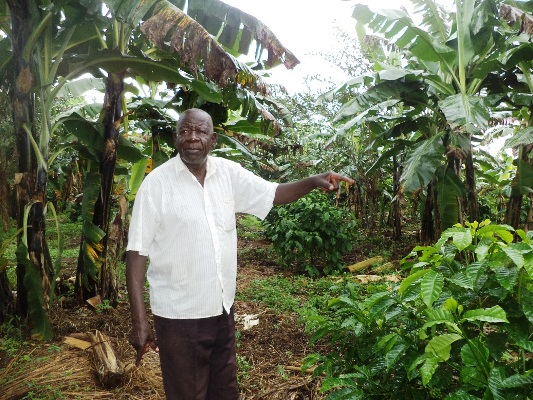Farmers have been urged to apply Good Agronomic Practices (GAPs) and pick only red/ripe cherries /Courtesy photo
Uganda’s coffee exports have been increasing in recent years.
In 2014, Government through Uganda Coffee Development Authority (UCDA) embarked on a countrywide drive to replant coffee in the country in order to revive coffee production that had stagnated at 3.5 million bags. Through this coffee replanting program, Government is pushing to have Uganda produce 20 million 60kg bags by 2025. The program is beginning to pay off going by recent statistics.
According to UCDA, exports for the calendar year (January 2020 to December 2020) totaled to 5,492,525 bags worth US515.94 million approximately (Shs1.902Trn), compared to 4,519,563 bags worth US$436.54 million equivalent to (Shs1.610Trn) the previous year.
This represents 22% and 18% increase in quantity and value respectively.
Business Focus’ Taddewo William Senyonyi Wednesday March 3, 2021 had an exclusive interview with Edmund Kananura, the Director Quality and Regulatory Services at UCDA, to respond to various issues including coffee prices and how prepared the organisation is to meet the target of producing 20 million 60kg bags of coffee by 2025.
Below are excerpts from the interview;
Qn: Uganda’s coffee exports are steadily increasing but there’s a belief that it’s mainly foreign owned companies profiteering. What’s your take on this? Doesn’t it concern you?
A: That is not true. There are over 70 coffee exporting companies, the majority of which are Ugandan companies. This list is available in the monthly reports on our website. What’s clear though is that exporting companies with more money are owned by foreigners because they have access to money with low interest rates.
Qn: What does it require for one to join coffee export business?
A: Two things – money and following set procedures. One needs about UShs 1 to 2bn to join the coffee export business. This is needed to buy coffee from farmers and process it.
Our coffee is on high demand because it has a unique taste and the standards are high.
Qn: Exporters seem to be enjoying profits from coffee at the expense of farmers. The prices for farmers remain low. What can be done to increase prices at farm level?
A: Coffee prices in Uganda are a reflection of international prices. Farmers are getting about 75% of the money from coffee exports. That said, Good Agronomic Practices (GAPs) and value addition will lead to increase in prices. Farmers can make money from coffee farming if they stop stripping cherries while harvesting; they should only pick red cherries. When you harvest only red cherries, the weight is higher compared to green cherries.
If farmers selectively choose red cherries, the out-turn of clean coffee will be significantly higher than if they used bad practices. Farmers should also use fertilizers to increase output. Farmers are also encouraged to join cooperatives or form groups for bulking purposes. They will get volumes that will attract better prices. Cooperatives or Saving Groups also help in stopping farmers from selling coffee while still immature.
Farmers should also use improved varieties. We are going to have more grading factories. When coffee is processed and graded, a farmer who has used good practices benefits more.
For Arabica farmers, wet processing is the way to go. However, this should be done carefully; coffee should be treated as food. Hand pulping isn’t good.
Uganda’s coffee is free from ochratoxin A (OTA) because we encourage farmers to use tarpaulins, raised drying beds and other good drying practices. We also encourage them to ensure they store the coffee in a well ventilated room. OTA is dangerous as it can lead to cancer and other deadly diseases.

Qn: What are Uganda’s strengths when it comes to coffee?
A: Our strength is that we have the best coffee. Last year (2020), a study released by the Coffee Quality Institute (CQI) revealed that Ugandan coffee is the third best in the world in terms of quality after Ethiopia and Kenya. In the same year, Ugandan coffee replaced India’s in Italy.
Qn: UCDA is pushing for 20m 60kg bags by 2025. How prepared is Uganda to ensure that this coffee is produced?
Uganda is prepared to produce these bags of coffee. The relevant policies, such as the NDP III and the Coffee Sector Strategy, are geared to this. We are creating an enabling environment for stakeholders, especially our farmers, to produce greater yields of coffee. Currently, UCDA is championing a campaign to rehabilitate and rejuvenate old coffee trees. Farmers who stump the old trees will receive fertilisers to boost productivity.
In addition to this, the existing processing factories have the capacity to process the targeted amounts; every exporter has a factory and when added together, their capacity is beyond 20m bags. We don’t necessarily need new factories.
Qn: UCDA seems to be focusing on exports instead of value addition. Don’t you think the talk should now be on value addition?
A: Uganda is doing the best in value addition. Compare the coffee shops we had 10 years ago and the ones we have currently. Almost all petrol stations have coffee shops now. Coffee shops are spread across Kampala and other upcountry towns. This is because UCDA has brought awareness about benefits of drinking coffee. We have promoted coffee consumption across the country.
We have also trained baristas, brewers and quality controllers to ensure they produce good quality coffee. Because of this quality has improved. We no longer have people roasting husks and marketing it as real coffee.
We have also trained roasters. There are currently 23 coffee roasters. If you go to supermarkets, you will find Ugandan coffee brands. We now have over 70 Ugandan coffee brands.
We have coffee shops that have been in business for many years; if they were closing, there would be a problem. That means coffee drinking culture is taking shape in Uganda. All restaurants want to have coffee. That’s a sign of growth. There’s a company selling 9 tonnes of coffee monthly here in Uganda.
Going forward, people will be focusing on the choice of taste. In the media, coffee is allover and the President is supporting coffee sector.
When it comes to Robusta, Uganda is a reference; our coffee is used to make fine Robusta. We are number one in terms of taste and quality. Like Ethiopia with original Arabica taste, we have the original taste of Robusta. Market for coffee is available especially in cold places where the culture of drinking coffee is high.
2kgs of Ugandan Robusta can yield a kg of instant coffee while in other countries, it takes 2.5kgs to have a kg of instant coffee. Our coffee is natural. With 20m bags, Uganda is set to disrupt other coffee producing countries. Coffee consumption remains high. Therefore, there shouldn’t be worry about Uganda increasing coffee production; it won’t affect us but others. China’s coffee consumption is still low but it has potential. They are drinking Ugandan coffee because it’s unique. They consume about 2m bags a year. If they can consume more, then Uganda’s coffee will have a big market share there. We have a representative office in China to do the marketing.
Qn: What key challenges are facing Uganda’s coffee sector?
Poor practices at the farm level remains a challenge but we are addressing that. We are working with Local Government to use model farmers in parishes to get farmers to embrace good agronomic practices.
Financing of farmers also remains a challenge. Many farmers aren’t under cooperatives or savings groups, so they find it hard to get access to both short term and long term financing. One action taken to address this, was that we signed an MOU with Uganda Development Bank to provide financing to farmer organisations (including on-lending to smallholder farmers), coffee businesses and investors.
We continue to provide information for all stakeholders to manage their coffee businesses. As such, we have produced Arabica, Robusta and Clonal Nursery manuals which have elaborate chapters on this. The manuals are available at the UCDA headquarters in Kampala and also on our website.
For inspiring stories, comments or tips, contact: 0775170346/0703828741/staddewo@gmail.com/ @TaddewoS







This is a very inspiring interview but to my observation as they campaign to increase coffee production to 20m bags by 2025, the focus should also be put on adding more value on exports to increase revenue and also find away of helping farmers survive problem of ever flactuating coffee prices at farm level
But the price isnt so much clear. They just comment on other issues but when asked about coffee prices being low at farm level They just go directly to farmers improving their farm practices to increase their output. As if this is the right answer for such a question.
Very educative article well articulated and shows huge progress.
why does Kenya’s coffee attracts higher prices than uganda’ coffee?